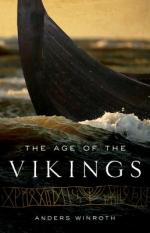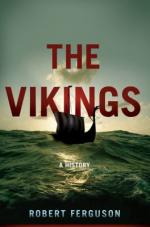November 16, 2020 | agudenburr
The Assassin's Creed games take historical events and give them a fantasy twist. In Assassin's Creed Valhalla you play as a Viking raider looking for a new home in 9th Century England. Check out one of the following books below to learn the history behind the characters and stories you encounter in the game.
The Vikings maintain their grip on our imagination, but their image is too often distorted by myth. It is true that they pillaged, looted, and enslaved. But they also settled peacefully and traveled far from their homelands in swift and sturdy ships to explore. The Age of the Vikings tells the full story of this exciting period in history.
Presents a history of the Nordic warriors and explorers who plundered and traded their way across Europe, and discusses how their conquests helped spread and enhance accomplishments in the arts, culture, and government.
The Viking Age--between 750 and 1050--saw an unprecedented expansion of the Scandinavian peoples. As traders and raiders, explorers and colonists, they reshaped the world between eastern North America and the Asian steppe. Based on the latest archeological and textual evidence, Children of Ash and Elm tells the story of the Vikings on their own terms: their politics, their cosmology, their art and culture.
In the dying days of the eighth century, the Vikings erupted onto the international stage with brutal raids and slaughter. The medieval Norsemen may be best remembered as monk murderers and village pillagers, but this is far from the whole story. Throughout the Middle Ages, long-ships transported hairy northern voyagers far and wide, where they not only raided but also traded, explored and settled new lands, encountered unfamiliar races, and embarked on pilgrimages and crusades.
In 865, a great Viking army landed in East Anglia, precipitating a series of wars that would last until the middle of the following century. It was in this time of crisis that the modern kingdoms of Britain were born. In their responses to the Viking threat, these kingdoms forged their identities as hybrid cultures: vibrant and entrepreneurial peoples adapting to instability and opportunity.
In Norse Mythology, Gaiman stays true to the myths in envisioning the major Norse pantheon: Odin, the highest of the high, wise, daring, and cunning; Thor, Odin's son, incredibly strong yet not the wisest of gods; and Loki--son of a giant--blood brother to Odin and a trickster and unsurpassable manipulator.
More than a reference to the Aesir and the Vanir pantheons, this encyclopedia draws upon a wealth of well-known and rare sources, such as the Poetic Edda, the Saga of Ynglingar by Snorri Sturluson, and The Deeds of the Danes by Saxo Grammaticus. Beyond the famous and infamous Norse gods and goddesses, Lecouteux also provides information on lesser-known figures from ancient Germanic pagan tradition.






